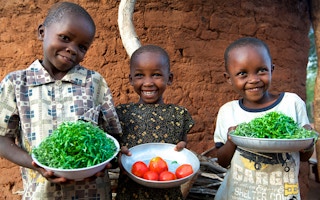Farmers in Mwingi, a remote, arid and impoverished region of Kitui County of Kenya have been experiencing unreliable rain patterns and problems associated with droughts.
Smallholder farmers have been losing up to about 80 per cent of their recent harvest, many water sources have dried up and some are having to travel up to 20 kilometres to collect water. Much of the water that is available is of poor quality, with some containing a high salt content, making it unsuitable for drinking or agricultural use.
But thanks to formation of a community-based organisations (CBOs) such as Kitum Community-based Organisation, with 176 members, the farmers are now devising innovative ways of coping up with climate change-related impacts that inflict untold sufferings upon them.
Nzoka Kathande, chairman of the Mwingi farmers group, is one of many farmers struggling to earn a living from the land in Mwingi.
The recent rains were poor, making it extremely tough for farmers such as Nzoka to grow enough food to feed their families. Faced with the problems, Kathande, a 47-year-old married father of three and his community, set up the farmers group in 2014 in hope that together they would be able to get desperately needed help.
“We have many challenges in this area. One of the reasons we started the CBO was because we want farming to be a business,” says Kathande. “For some time we have been growing crops that have not done well so we have come together to work out what will grow successfully in this climate.
“
We came together in a farmers group to unite so we can have bargaining power.
Nzoka Kathande, chairman, Mwingi farmers group
“Another challenge we face is water for domestic use and livestock. The rains have become more unreliable in recent years and we have to travel long distances to get water. We waste a lot of time collecting it which could be used for other activities.”
In addition to water scarcity, another problem facing the community is the loss of crops due to pests and disease
.
Most farmers lack access to modern agricultural technology that would help protect and preserve their harvests. Thus, their income remains low, leaving them trapped in a cycle of poverty and making them unable to produce enough surplus to sell to earn them the money needed to invest in inputs such as quality seeds, pesticides, fungicides and preservatives.
To help farmers address the various challenges, an international development charity Farm Africa has recently begun working with the Mwingi CBO farmers group and seven other groups in the area.
Nzoka is one of about 100 local farmers being trained in farming techniques to conserve water and soil. They are also being given access to high-quality seeds which are more resistant to pests and diseases, and which grow drought-tolerant crops such as sorghum.
In addition, farmers groups will be supported to access markets where they can join sell their harvests for a better price.
“We came together in a farmers group to unite so we can have bargaining power,” says Nzoka, adding that they lack adequate crop storage and markets for the farm produce.
With the right training and support being given, Nzoka and others in his community can become more resilient to the type of climate shocks and trends which affect Mwingi. By increasing the amount they can harvest they would be more able to feed their families and earn additional income from selling their surplus, which can be invested to further improve their businesses.
The farmers’ group is hopeful about what the future holds once they receive the necessary assistance.
Kathande tells SciDev.Net: “We want Farm Africa to provide training and support, and it comes as a relief that they are helping us to get the information we need on sustainable agriculture because it means we will know much more about farming as a business. They will be able to link us to other value chain actors which will help us to sell our crops for a better price”.
He adds: “It is important that we get training that can impact on our livelihoods. Empowerment is vital so we can break away from the donor dependency syndrome. The training we will receive will empower us to become independent so that when Farm Africa exits will be able to continue improving.”
This piece was produced by SciDev.Net’s Sub-Saharan Africa English desk.










